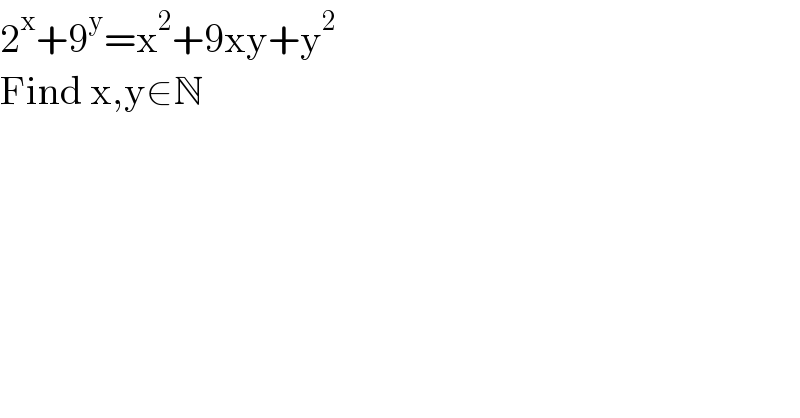
Question and Answers Forum
Question Number 143706 by Huy last updated on 17/Jun/21

Answered by TheHoneyCat last updated on 17/Jun/21
![for x=10 we get: 1024+9^y =^? 100+90y+y^2 checking in y=10 and studing the derivative one gets: ∀y≥10, 1024+9^y >100+90y+y^2 looking at how the values evolve for x (the derivative for x) we get also that ∀x,y≥10 2^x +9^y >x^2 +9xy+y^2 Checking, with a computer, for all the values (x,y)∈[∣0,10∣]^2 I found that there are only two possibilites: (x,y)∈{(1,1);(3,0)} by the way, it is surely possible to get a better maximum value than ′′10′′ so that the verification can be done by hand I was just too lazy to do it efficiently](Q143716.png)
| ||
Question and Answers Forum | ||
Question Number 143706 by Huy last updated on 17/Jun/21 | ||
 | ||
Answered by TheHoneyCat last updated on 17/Jun/21 | ||
![for x=10 we get: 1024+9^y =^? 100+90y+y^2 checking in y=10 and studing the derivative one gets: ∀y≥10, 1024+9^y >100+90y+y^2 looking at how the values evolve for x (the derivative for x) we get also that ∀x,y≥10 2^x +9^y >x^2 +9xy+y^2 Checking, with a computer, for all the values (x,y)∈[∣0,10∣]^2 I found that there are only two possibilites: (x,y)∈{(1,1);(3,0)} by the way, it is surely possible to get a better maximum value than ′′10′′ so that the verification can be done by hand I was just too lazy to do it efficiently](Q143716.png) | ||
| ||